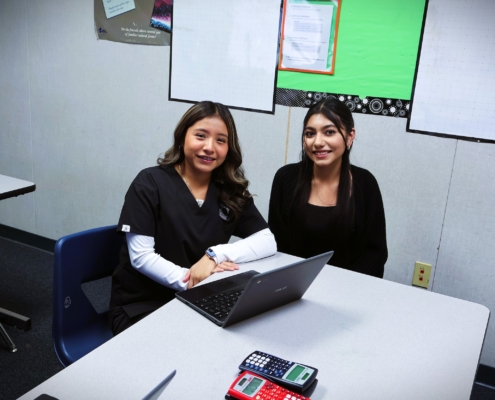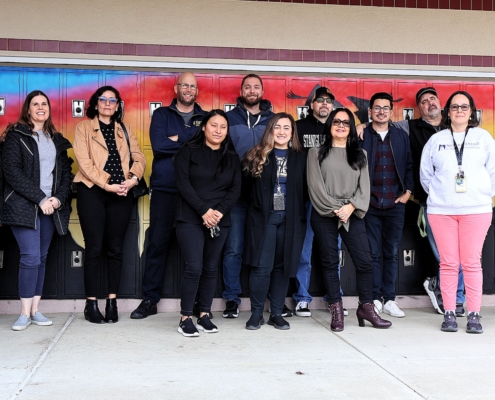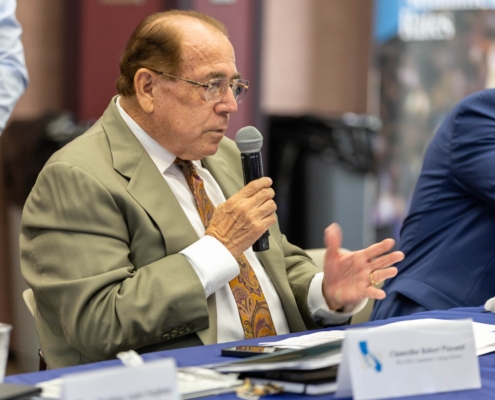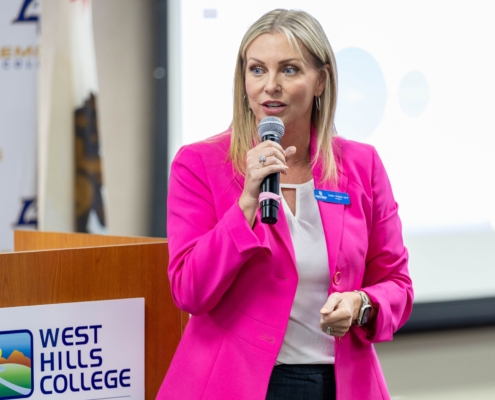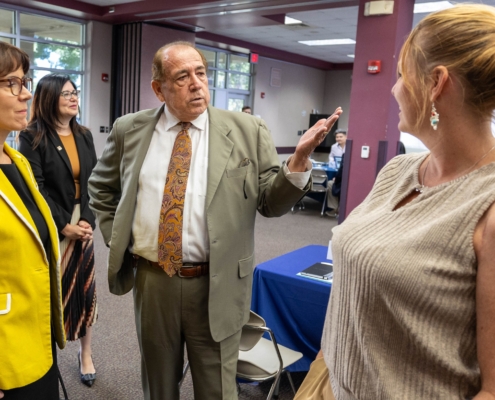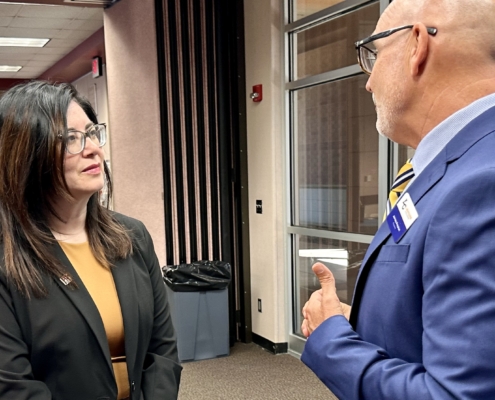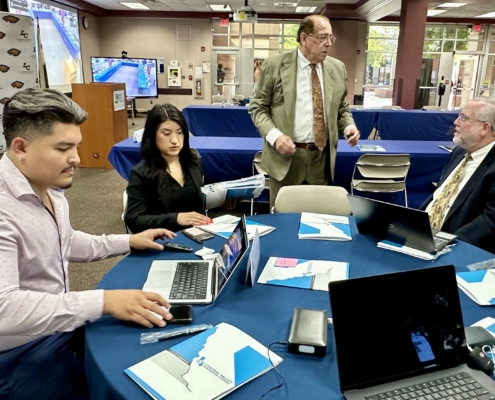CVHEC EXECUTIVE DIRECTOR’S MESSAGE (March 2025)
Spring excitement in the valley’s higher education scene
Greetings CVHEC friends and colleagues …
With the spring 2025 semester now in full swing, welcome to our March newsletter. We are excited about all that is going on in the Central Valley region beginning with our annual CVHEC Higher Education Summit set for May 9, 2025.
Registration is now available as we continue preparing for the summit. We welcome and encourage your participation this year.
 In this issue, please read about some of the summit topics we will be covering. Among those topics will be the work that the CVHEC Math Task Force has been undertaking to deal with the changing math requirements in higher education throughout the state mandated through Assembly Bill 1705. They will be holding a follow-up convening March 28 that will include a presentation by two valley community college math professors who traveled to Atlanta for a national math conference where they shared the “Central Valley Way” underlying the task force’s work the past two years.
In this issue, please read about some of the summit topics we will be covering. Among those topics will be the work that the CVHEC Math Task Force has been undertaking to deal with the changing math requirements in higher education throughout the state mandated through Assembly Bill 1705. They will be holding a follow-up convening March 28 that will include a presentation by two valley community college math professors who traveled to Atlanta for a national math conference where they shared the “Central Valley Way” underlying the task force’s work the past two years.
Also, this issue we are excited to feature the recent California Dual Enrollment Equity Conference in Sacramento where I led a delegation of team members and high school educators for a panel we were invited to present, “Using Dual Enrollment as a tool for Math Alignment and Increasing Instructor Capacity in the Central Valley.”
Speaking before a very interested audience of educators from throughout the state on Feb. 24, we discussed how our Master’s Upskilling Program — generously funded by our partners: the Fresno/Madera K16 Collaborative, the Kern K16 Collaborative and the We Wil K16 Collaborative – is providing approximately 225 high school teachers from throughout the Central Valley with the opportunity to earn Master’s degrees in English or mathematics making them eligible to teach dual enrollment courses. In addition to the upskilling program, we were joined by College Bridge and two valley educators to discuss how our Math Bridge program is working collaboratively and creatively with secondary and post-secondary educators to systemically align college and high school math programs, creating a seamless transition for students.
Also, enjoy this month’s “What the CV-HEC is Happening” Blog from our guest contributor, valley native, Dr. Iliana Perez. She is the executive director of Immigrants Rising, an advocacy group based in San Francisco that has been assisting member colleges of the consortium, as well as throughout the state, with information regarding the current status of undocumented students in higher education and resources available to them. Once a dreamer student herself at CVHEC-member Fresno State, Iliana presents a remarkable academic journey that now has her giving back to her community in a significant manner in support of vulnerable students.
We are also happy to welcome Dr. Kristin Clark, chancellor-emeritus of West Hills Community College District, who joins our CVHEC Team as dual enrollment lead, just in time for Dual Enrollment Week March 10-14. Welcome Kristin!
May your spring semester be fruitful and enjoyable and what better way than to join us at our higher education summit May 9?
CVHEC EXECUTIVE DIRECTOR’S MESSAGE (February 2025)
Dr. Sonya Christian, California Community Colleges chancellor (second from left), and Central Valley Higher Education Consortium executive director Benjamin Duran (third from left) greeted high school student panelists at the Dual Enrollment In the Central Valley Convening 2025 – CVHEC/CVDEEP where she delivered keynote Feb. 3: Jonathan Alfaro and Ailyn Morales of Mendota High School with Principal Travis Kirby; and Isaac Dircio and Andres Medina Zapien of McFarland High (McFarland Unified School District) with Jill Jimenez and Jordynn Jimenez of McFarland High School Dual Enrollment.
CVHEC: power of collaboration – the ‘Central Valley Way’
Greetings CVHEC friends and colleagues …
This February edition of our Central Valley Higher Education Consortium newsletter continues sharing with you the great work that the boots-on-the-ground folks at our member institutions are doing to serve our students.
 You will read about two convenings, the recent Central Valley Dual Enrollment Convening with 140 attendees and the Central Valley Math Task Force Convening scheduled for March 28. These two high-powered collaborations showcase the work our colleges and universities are doing in both the expansion of dual enrollment providing opportunities for high school students to take college courses while in high school, and addressing the challenging college level math courses that are essential for them to be successful in college.
You will read about two convenings, the recent Central Valley Dual Enrollment Convening with 140 attendees and the Central Valley Math Task Force Convening scheduled for March 28. These two high-powered collaborations showcase the work our colleges and universities are doing in both the expansion of dual enrollment providing opportunities for high school students to take college courses while in high school, and addressing the challenging college level math courses that are essential for them to be successful in college.
Also, please make sure you read about our unique-to-California Central Valley Transfer Project. The project has provided academic transfer pathways for Central Valley community students from our regional community colleges to the three California State Universities in the valley and UC Merced. The outcomes from these efforts have been impressive in terms of dramatically improving transfer rates while closing the gaps between the general student population and valley students of color. The project was designated a California Community Colleges Chancellor’s Office Demonstration Project in 2023, by Chancellor Sonya Christian. We are proud to report to her that it is now ready to be disseminated to the rest of the state as a model that is ready to be replicated.
This month’s “What the CV-HEC is Happening” blog is an entry by a local attorney, Ashley Emerzian, about the legal aspects around hazing on higher education campuses. Please enjoy her entry and we hope you learn more about the topic as you peruse the article. Ashley has graciously offered to submit articles highlighting higher education legal issues relevant to our region for future CVHEC newsletters as well.
This CVHEC Board of Directors also has a busy schedule this spring as its members – the chancellors, presidents and campus directors of our 28 member institutions of higher education in the valley — prepare for the spring quarterly board meeting and a strategic planning retreat.
Additionally, as they move forward under the leadership of CVHEC Board Chair, UC Merced Chancellor Juan Sánchez Muñoz, we look forward to the annual CVHEC Higher Education Summit scheduled for May 9. Please mark your calendars and stay tuned for further details. We look forward to having you join us to continue collaborating “the Central Valley Way!”
Please enjoy our newsletter and feel free to share it with your colleagues and friends and encourage them to subscribe.
MATH BRIDGE UPDATE: providing tools for postsecondary journeys
 Nathan Savig teaching a Math Bridge prep course to students at Mariposa High School in the fall 2024 semester. These students are part of the 332 program enrollees who will take their first Math Bridge college class this spring at their respective high schools.
Nathan Savig teaching a Math Bridge prep course to students at Mariposa High School in the fall 2024 semester. These students are part of the 332 program enrollees who will take their first Math Bridge college class this spring at their respective high schools.
EDITOR’S NOTE: Since the Central Valley Math Bridge program was funded in late 2022 in partnership with the Central Valley Higher Education Consortium, the Rand Corporation and several community college members of the consortium with funding from the California K-16 Collaborative (Central – Fresno, Madera, Kings Counties; and We Will! – North Valley), its small but energetic College Bridge team has made headway into 18 high schools in the consortium’s 10-county region. The first Math Bridge cohort at 13 of those schools began in the fall with a prep course and now the 332 high school students enrolled in the program at those schools will be taking their first college course this spring (see list below). The other five schools will start in fall 2025. This update submitted by Audra Burwell, College Bridge communication coordinator, presents the program’s 2024 progress as it moves into 2025 with its first cohorts.
‘… facilitating meaningful discussions about
how math applies to the real world …’
As we step into spring 2025, College Bridge is making significant strides in expanding its Math Bridge project to reach more high school students across the Central Valley.
This innovative initiative aims to ease the transition from high school to college-level mathematics by offering a rigorous college-level math curriculum alongside the support of high school and college instructors. This collaboration is laying the foundation for academic success and providing students with the tools they need to succeed in their postsecondary journeys.
Across classrooms, high school math instructors are teaming up with college faculty who bring their credentials and college-level expertise to the learning environment. Together, they combine their knowledge and experience, brainstorming examples, solving problems, and facilitating meaningful discussions about how math applies to the real world.
In many classrooms, high school instructors are also dual-certified, holding credentials that allow them to teach at the college level. This professional development is often made possible through the Central Valley Higher Education Consortium’s (CVHEC) Master’s Upskilling Program, which equips educators with the tools and expertise to teach college-level material to high school students.
In 2024, thanks to the dedication of educators, counselors, and administrators, Math Bridge expanded its reach to serve 13 high schools across the Central Valley (see list below). But College Bridge isn’t stopping there—2025 marks a year of even greater growth. Five new schools will join the Math Bridge initiative, helping to expand the program’s impact across the region. Le Grand High School, El Capitan High School, Merced High School, Dos Palos High School, and Gustine High School will be the newest members of the Math Bridge network. These new partners will help ensure that even more students have access to the support they need to succeed in math, breaking down barriers to higher education.
This expansion is made possible thanks to the WE Will! K-16 Educational Collaborative grant, which helps provide additional resources for high school students preparing to enter college. The partnership between K-12 and higher education institutions is creating a more seamless transition for students into postsecondary education, and the inclusion of these new schools is expected to further enhance the success of the program.
Beyond Math Bridge, College Bridge remains committed to supporting students’ overall educational pathways. One of the key components of this broader support is the concurrently with the Math Bridge program.
CT Bridge is designed to provide students with the tools and information they need to succeed in their transition to college such as filling out applications; making their fall college schedule; accessing their college portal; understanding FAFSA and financial aid options; gaining career advice; and how to access college support services—all in just 10 hours of course material per year. By offering students insights into both academic and career pathways, CT Bridge is helping them prepare for success not just in their math courses, but in their future college and career endeavors.
As College Bridge continues to evolve and expand, the organization remains focused on ensuring that students have access to the resources and guidance they need to thrive. In the coming months, College Bridge will be hosting several Student Info Sessions to encourage high school students to apply for the Math Bridge program for the 2025/2026 school year. These sessions will provide students with a chance to learn more about the opportunities offered by Math Bridge and CT Bridge, as well as how they can benefit from these programs.
Additionally, College Bridge will continue hosting Planning and Strategy Sessions for Central Valley educators and counselors
Stay tuned for more updates as we continue to move forward with these vital initiatives!
Math Bridge Cohorts 2024-2025
(Breakdown of 332 students currently enrolled in the Central Valley Math Bridge Program at 13 high schools,
listed by community college partners that are CVHEC members):
DELTA COLLEGE
Stagg: 24
Weber: 26
MERCED COLLEGE
Buhach Colony: 18
Atwater: 26
Golden Valley: 36
Livingston: 33
Mariposa: 34
REEDLEY COLLEGE
Dinuba (2 sections): 34
Orosi: 23
Sanger: 30
Sanger West: 11
TAFT COLLEGE
Taft: 12
Riverdale: 25
(Five additional high schools will onboard in the fall semester: Le Grand, El Capitan, Merced, Dos Palos and Gustine).
CVHEC EXECUTIVE DIRECTOR’S MESSAGE (January 2025)
2025: ‘higher education is at a crossroads’
Greetings CVHEC friends and colleagues …
It is a delight to welcome you to 2025 on behalf of the Central Valley Higher Education Consortium member colleges and universities as well as the CVHEC staff that has the privilege of working with our members on the impactful work they undertake in our Central Valley region – work that strives to improve the well-being of our students, their families and the communities we live in.
Before we proceed, let me join you all in wishing our colleagues and students from our sister colleges and universities in Southern California safety, security and well-being as they deal with the horrific and unimaginable fires raging. It is heartening to see those higher education campuses in the region serving as sites joining in efforts to assist the victims. Our thoughts and prayers are with them.

In our last edition, we shared with you the successes and highlights of the previous year. In this, our first newsletter of the year, we are happy to share some of the events and initiatives planned in the coming months.
First, you will note that Dr. Sonya Christian, chancellor of the California Community Colleges and Central Valley native, will join us Feb. 3 as the keynote speaker for our convening “Dual Enrollment — the Central Valley Way.” At this event, with educators and policymakers in our 10-county region, we will showcase the successes achieved throughout the Central Valley in the delivery of dual enrollment courses to regional high schools by our community colleges and examine what is ahead so that we work in unison, as one voice, as much as possible.
Also in this edition, you will read about the first cohort of Math Bridge high school students that began in the fall with a prep course and will now be taking their first college course this spring through the innovative approach rolled out in 2023 by College Bridge in partnership with CVHEC, community college consortium members and Rand Corporation.
As the spring progresses, CVHEC will hold similar convenings around other student success initiatives that are being implemented as well as to begin discussing strategic planning for the consortium. Details will be forthcoming on those events and plans but chief among them is the annual CVHEC Summit scheduled for May 9.
The summit is where the heads of the valley’s higher education institutions – the CVHEC Board of Directors – come together for a full day of showcases and discussions regarding education issues pertinent to our region. We will be joined by our colleagues, partners and friends. We look forward to hearing from our annual panel of legislative leaders from the Valley and, just as important if not moreso, them hearing from us. Watch for more details in our February issue.
In this issue, we are pleased to announce that this year the CVHEC Board of Directors will be chaired by Dr. Juan Sánchez Muñoz, chancellor of UC, Merced. Presently, two board meetings are in the works for this spring.
In closing, we also kick off 2025 with a special edition of our “What the CV-HEC Is happening” Blog: a reprint of the speech delivered by Dr. Jaime Merisotis, president of the Lumina Foundation, at the Complete College America Conference in Indianapolis, Indiana last November: “Progress in a time of disruption: the urgency of reimagining higher ed.”
CVHEC sent a delegation to the three-day conference where we were fortunate to hear President Merisotis issue both an alarm and a call to positive action. He warned that higher education is at a crossroads due to changes ranging from COVID, climate change effects, worldwide unrest, political polarization here in the US and a declining confidence in higher education due to distorted information.
But he calls upon our higher education community nationwide to heed a unique “opportunity to use this moment of extreme stress to pursue genuine, urgently-needed systemic change.
“Bluntly stated, this means calling BS on the outrageous distortions about higher education while also pursuing urgently-needed changes,” Dr. Merisotis told us. “These things are both possible, and not in contradiction.”
I hope you enjoy the blog and that this national education leader’s words generate some dialogue between you and your colleagues. We encourage you to share those conversations, as we will, on our various CVHEC social media platforms.
Once again, welcome to the new year and we look forward to maintaining and strengthening ongoing relationships with you as the year unfolds.
CVHEC Notes – 2025
CVHEC Notes (January 2025)
CVHEC office changes to Zoom telephone – new number
As of Jan. 1, the Central Valley Higher Education Consortium (CVHEC)
is transitioning to Zoom phone. Our main office number is now 559.278.0576.
Click here to add your own text
CVHEC DIRECTOR’S MESSAGE (December 2024): Happy Holidays!
 Best wishes for 2025 from the Central Valley Higher Education Consortium team: (FRONT) Dr. Liz Rozell,
Best wishes for 2025 from the Central Valley Higher Education Consortium team: (FRONT) Dr. Liz Rozell,
Priscilla Arellano and Elaine Cash. (BACK) Tom Uribes, Tom Burke, Stan Carrizosa,
Dr. Benjamín Durán, Dr. John Spevak, Dr. Vikash Lakhani and Ángel Ramírez.
Revisiting an eventful year and strategies
for student success the Central Valley Way
Greetings CVHEC friends and colleagues …
Welcome to the end of the fall 2024 semester and the beginning of the well-deserved winter break!
I hope you enjoy the final edition of this year’s CVHEC e-newsletter. You will have the opportunity to join us in revisiting the highlights of this eventful year and the strategies our colleges and universities have engaged to improve the pathways to retention and timely completion for our Central Valley students. On that note, a hearty congratulations to those who completed their academic journey this month. And congrats as well to the faculty, staff and administrators who provided the academic guidance to support your success. All the best to you Class of Winter 2024 graduates!
 Among the many successes of this past year is the historic mission to address implementation of Assembly Bill 1705 with our Math Task Force convening community college math education professionals from throughout our 10-county region to communicate and collaborate for strategies that benefit valley college students. We have also seen great advancement of our Transfer Project which completes its first year as a California Community Colleges Demonstration Project.
Among the many successes of this past year is the historic mission to address implementation of Assembly Bill 1705 with our Math Task Force convening community college math education professionals from throughout our 10-county region to communicate and collaborate for strategies that benefit valley college students. We have also seen great advancement of our Transfer Project which completes its first year as a California Community Colleges Demonstration Project.
These CVHEC initiatives have established what we call “the Central Valley Way,” a movement that his gained recognition in higher education circles beyond our region. We have had the opportunity to share this great work with audiences at the state and national levels at such convenings as the Complete College America Conference in Indianapolis, Indiana along with California convenings like the Community College League of California and the California Economic Summit.
It has been an honor and a delight to shine the light on the region and our member institutions and we especially commend our Math Task Force members and Transfer Project team for their diligence this past year.
We would also like to take this opportunity to thank our funding partners who make it possible for us to do our work. Thanks to the College Futures Foundation, Fresno-Madera K-16 Collaborative, the Kern Regional K-16 Education Collaborative, the We Will! K-16 Educational Collaborative, College Bridge, and the CVHEC membership. These colleagues have been instrumental in transforming the region socially, economically and educationally.
As you enjoy our final newsletter of the year, we wish you a joyful holiday season and a wonderful New Year!!
CVHEC DIRECTOR’S MESSAGE (November 2024): The fall winds of change
The fall winds of change
Welcome to our post-election edition of the Central Valley Higher Education Consortium e-newsletter.
Each presidential election brings new changes and initiatives nationally, and this one will be no exception. In future editions of our newsletter, we will highlight and explore changes coming to higher education from our new administration and how those impact our Central Valley colleges, universities and students in the region and similar rural regions in California.

In this edition, please enjoy articles that feature some of the ongoing work that is taking place and the introduction of local research that gives a more intimate look at the performance of our students from underpromoted communities in the region.
Our Math Task Force has been working in a collaborative manner to address issues and concerns surrounding the implementation of AB 1705, its impact on our students, and how Central Valley math faculty have taken on the task of ensuring the legislation is implemented in an equitable and fair manner. The findings and outcomes of these efforts were highlighted at the “CV Way to AB1705 Success and Beyond” convening held at the Clovis Community College Herndon Center Oct. 25, 2024. Many of these math faculty worked through the summer to prepare for the convening of colleagues from throughout the valley.
You will also be introduced to a research initiative at UC Merced funded by the Bill & Melinda Gates Foundation and led by Principal Investigator Dr. Zenaida Aguirre-Muñoz and Dr. Orquidea Largo: the UC Merced Advancing Educational Opportunity in the Central Valley Project. This team of researchers is taking a deeper more nuanced look at the performance of Central Valley students and their performance in courses designed to prepare them for entrance into the college or university of their choice.
In addition to that article summarizing completion pf phase one of this project last month, you can read more about these efforts in Dr. Aguirre-Muñoz’s “What in the CV-HEC is Happening” blog this month. As the research team continues with the next phases of their work, we are hoping to see evidence that the work by CVHEC colleges and universities in recent years is reflected in the data that emerges.
We also invite you to enjoy news entries about some of our member institutions and other related news articles. With Veterans Day just behind us, we also pay tribute to the men and women of our nation’s military who have selflessly served to build a nation liberty and equality.
Now, as we approach the end of the fall semester and welcome the Thanksgiving holiday season, we wish you well!
CVHEC DIRECTOR’S MESSAGE (October 2024)
Fall momentum: creating rich learning
environments for successful collegiate experiences
Greetings CVHEC friends and colleagues …
We are delighted to share the October CVHEC e-newsletter with you and welcome you to enjoy the content we have prepared as this fall 2024 semester moves into high gear.
In this edition, we congratulate and welcome Dr. Vernon Harper as the newly installed president of California State University, Bakersfield. Please join us in reaching out to him with well wishes.
 We also congratulate and welcome Dr. Todd Hampton as the newly appointed interim superintendent/president of the West Kern Community College District/Taft College. Both Dr. Harper and Dr. Hampton bring strong leadership to the students in Kern County and to our CVHEC Board of Directors.
We also congratulate and welcome Dr. Todd Hampton as the newly appointed interim superintendent/president of the West Kern Community College District/Taft College. Both Dr. Harper and Dr. Hampton bring strong leadership to the students in Kern County and to our CVHEC Board of Directors.
You will also see the continuing efforts in the Central Valley by our member institutions to create a rich learning environment to make our students successful as they strive to complete their post-secondary education. You will see references to two upcoming convenings that will highlight these efforts the “The Central Valley Way to AB 1705 Success and Beyond” later this month and the Central Valley Dual Enrollment for Equity and Prosperity (CVDEEP) Task Force Convening next month.
For the first convening Oct. 25, read about the CVHEC Math Task Force bringing together regional mathematics faculty to continue addressing challenges and barriers resulting from Assembly Bill 1705. These math professionals have worked through the summer and into the fall semester to develop strategies for delivering math solutions for many students and sharing them with their colleagues in the region for compliance with the state legislation.
We are especially proud that two of these faculty members have been invited to represent the Central Valley by delivering a session at a national mathematics convention in Atlanta, Georgia this November. It is so good to see our region receiving national attention for the good work of our faculty. Congratulations Jeremy Brandl of Fresno City College and Shelley Getty of Taft College.
For the CVDEEP Task Force convening Nov. 14, we will see college and university professionals highlighting their work around delivering college level courses to high school students from rural high schools using an online dual enrollment strategy as a vehicle to reach populations that do not typically have the opportunity to benefit from taking college level courses while still in high school. This is a great way to infuse equity and inclusion into our partner institutions for those students who will benefit from getting a jump-start on gateway college courses that are essential for the successful completion of their degrees and certificates.
We will also be participating in some conferences of our own. CVHEC representatives will be at the California Economic Summit Oct. 8-10 in Sacramento and the Complete College America National Conference Nov. 18-20 in Indianapolis where we hope to re-connect with many of our partners across the state and nation and meet new ones.
This month’s “What the CV-HEC is Happening Blog” is by guest blogger Marni Cahoon, a Taft College math professor, reflecting on the successful dual enrollment venture our consortium member in the West Kern Community College District has implemented
Lastly, enjoy highlights of CVHEC member institutions and other topics we thought would be of interest.
CVHEC DIRECTOR’S MESSAGE (September 2024)
PPIC report/panel, CVHEC
board meeting kick off fall 2024
Greetings CVHEC friends and colleagues …
The CVHEC Board of Directors held its quarterly meeting Sept. 4 and heard a detailed report about the region’s equity and student success work from the previous spring semester, as well as the introduction of three new initiatives that are being launched valley wide.
Though the summer break provided an opportunity for rest, reflection and rejuvenation for some, a pool of dedicated math professors of our CVHEC Math Task Force worked throughout the break on the implementation of AB 1705, a piece of legislation designed to redesign the way calculus and other college math courses are delivered to incoming college freshmen. The work of this group will culminate in the Central Valley Math Convening of math professionals in the region on Oct. 25. This convening is a testimony to the dedication of the math educators and other education professionals in our valley serving our students.
Finally, let me call your attention to a report delivered by the Public Policy Institute of California (PPIC) that speaks to the college going rates in our region and some of the efforts that CVHEC and other partners throughout the valley are engaged in to address issues around enrollment, transfer and completion rates. The PPIC hosted a statewide virtual panel to showcase the report and invited me to join my colleagues Dr. Orquidea Largo from UC Merced and Tressa Overstreet from the Fresno Unified School District to discuss the report from both the higher education and K-12 perspectives.
As always, thank you for taking the time to read about the terrific work that our Central Valley colleges and universities are doing to advance the economic and social wellbeing of this import part of California.
PHOTO GALLERY: CVHEC Board of Directors – Sept. 4, 2024 (Lemoore College)
Photos by Antonio Aguilar, West Hills Community College District photographer, and Tom Uribes, CVHEC. Special thanks to Amber Myrick, WHCCD director of Marketing, Communications and Public Information.



